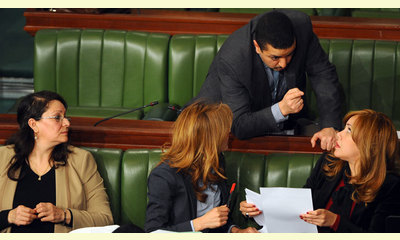|
|
Tunisia opts for civil, not Sharia law as assembly votes on new constitution
an article by RT News (abridged)
Tunisia has rejected Islam as the source of its
laws, with the country’s Islamist-dominated
constituent assembly voting to adopt new articles
amid fears that ongoing disagreements may derail
the constitution altogether.

Tunisian Islamist MP and General Rapporteur of the constitution Khedher Habib speaks with his colleagues during a meeting of the Constituent Assembly on January 3, 2014 in Tunis. (AFP Photo / Fethi Belaid)
click on photo to enlarge
The country that in 2011 gave birth to the Arab
Spring has adopted new articles in its upcoming
constitution, the first two of which state that
Tunisia is a “civil” republic based on the rule of
law, but with Islam remaining as its state
religion. After Saturday’s vote [January 4], 12
of the 146 articles discussed have now been
adopted.
The articles received harsh criticism from
opponents, some of them believing that an absence
of Islam from the legal framework would open the
door to “Satanism and idolatry.” In fact, the
assembly, which was set up in 2011 to establish a
new constitution after the uprising that removed
the then-president, Zine el-Abdine Ben Ali, was
plagued by so much infighting that there are fears
that the January 14 deadline for ratifying the new
constitution would not be met, AFP reported.
Although a secular country during the former
president’s rule, months of violent political
unrest and assassinations opened the door for new
ideas on how the country should be run. But
Saturday’s vote put that on hold, retaining
Islam’s position only as a moral – not legal –
authority.
While Islam will remain the state religion, the
government, under one of the newly accepted laws –
Article 6 – will become “the guardian of
religion,” “protector of the sacred” and shall
guarantee “freedom of conscience,” something that
has been hotly debated even by the law’s
proponents, for fear of misinterpretation by those
in power.
Saturday’s vote also rejected two amendments under
which the Koran and Sunna – the acts, sayings and
judgments of the Prophet Mohammed – as well as
Islam itself, were to have legal power.
By implication, mosques would no longer be
associated with, or used for, political activity.
The assembly was set to convene again Sunday to
proceed with other articles. The new constitution
will need to receive more than 140 votes, which is
two-thirds of the 217-member assembly. If not, it
will be put to a referendum.
Tunisian politicians hold very differing points of
view on Islam’s place in law and civil society.
Human rights activists have welcomed the votes,
seeing that religious courts with serious
consequences for the individual have been
prevented; while those advocating freedom within
an Islamic framework argued that even with Islam
as the source of law, people would have nothing to
fear for their freedoms, because Islam would give
its “spiritual backing” and support them. One
such belief comes from a party calling itself the
“Current of Love.”
But backers of Islam were unrelenting in their
view that under the new law, virtually any other
belief known to man could flourish.
Other, more secular politicians, like Mahmud
Barudi of the Democratic Alliance, believe that
adopting amendments under which Islam and its
religious texts are law was equal to living in the
past.
To counter the proponents of the view that a lack
of Islam in the legal framework would allow
“Satanism” to thrive, the ruling Ennahda party’s
Sonia Ben Toumia said that “Islam is a religion
that guarantees freedom of religious practice to
others” . . .
[Note: Thank you to Kiki Chauvin, the CPNN
reporter for this article.]
|








|
DISCUSSION
Question(s) related to this article:
The Arab Spring, Can Tunisia continue the momentum they started?
* * * * *
LATEST READER COMMENT:
The following commentary is translated from Martine Gozlan in Marianne
No, the Sharia is not being applied, and yes, the charge of apostasy is prohibited. No, Islam is no longer the source of law, and yes, the woman is the equal of the man . And freedom of conscience is protected. Tunisians, with a minimum of violence and a maximum of reason, have fought for a constitution that rejects obscurantism and opens the door to a secular hope in the Arab world.
Moreover, there is no longer the choice of the bearded or the képi. If Islam is to bite the dust, there must tanks in the streets. And the Islamists, of course, have the hideouts and the explosives. Moreover, there is no choice: it is blood for blood and the exclusion of the other from the making of history. And besides, they touched the Tunisian people, who rejected it. . ...more.

|
|









